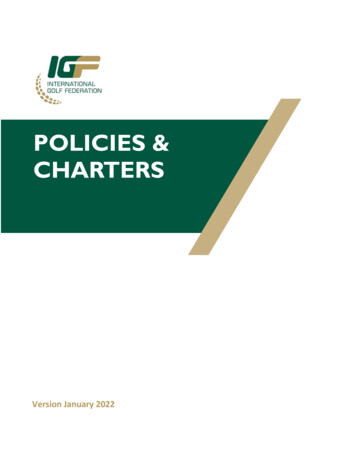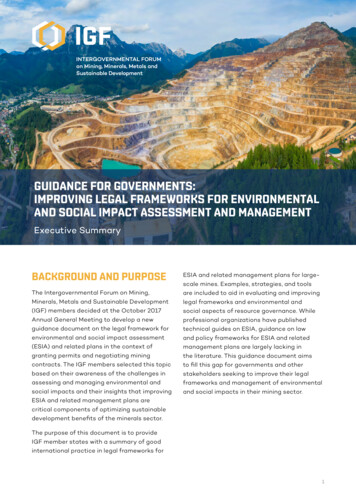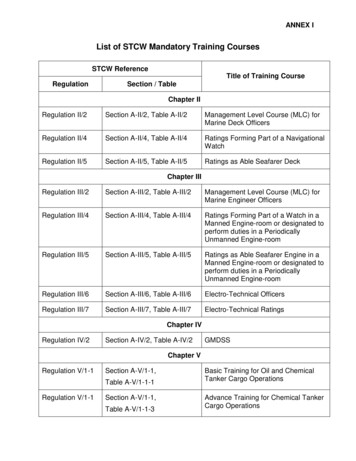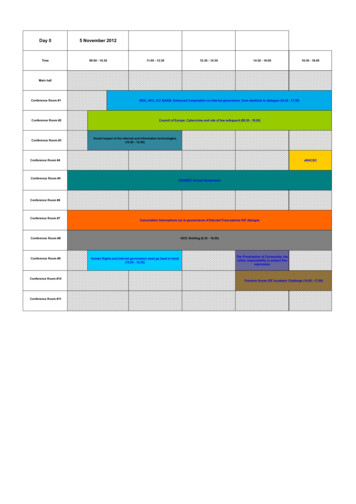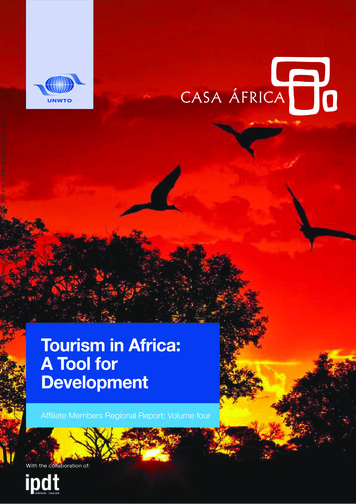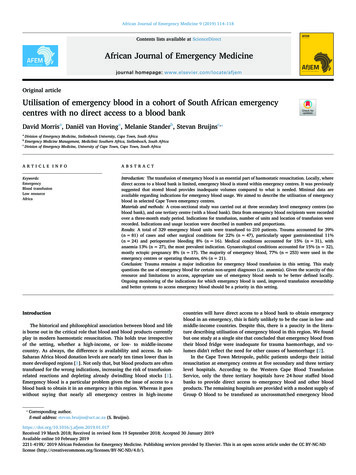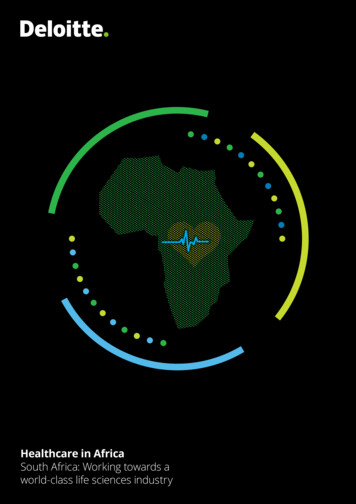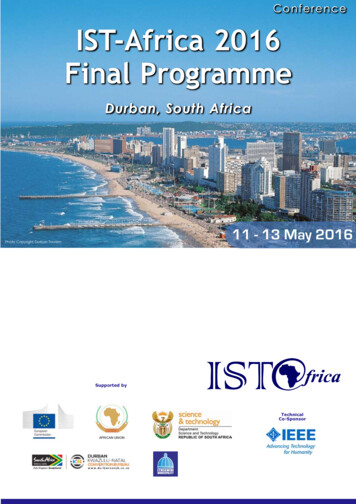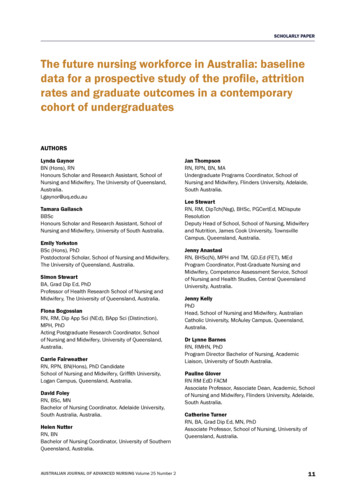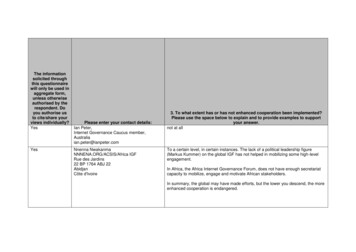
Transcription
The informationsolicited throughthis questionnairewill only be used inaggregate form,unless otherwiseauthorised by therespondent. Doyou authorise usto cite/share yourviews individually?YesYesPlease enter your contact details:Ian Peter,Internet Governance Caucus member,Australiaian.peter@ianpeter.comNnenna NwakanmaNNNENA.ORG/ACSIS/Africa IGFRue des Jardins22 BP 1764 ABJ 22AbidjanCôte d'Ivoire3. To what extent has or has not enhanced cooperation been implemented?Please use the space below to explain and to provide examples to supportyour answer.not at allTo a certain level, in certain instances. The lack of a political leadership figure(Markus Kummer) on the global IGF has not helped in mobilizing some high-levelengagement.In Africa, the Africa Internet Governance Forum, does not have enough secretariatcapacity to mobilize, engage and motivate African stakeholders.In summary, the global may have made efforts, but the lower you descend, the moreenhanced cooperation is endangered.
YesCountry: DEMOCRATIC REPUBLIC OFCONGOOrganization: CENTRE AFRICAIND'ECHANGE CULTURELPreparatory meetings during the two phases of WSIS had worked well for so led tothe 2003 Action Plan and the Tunis Agenda 2005.Which logically should facilitate further consultations at the national and regionallevel in the forum of Internet governance.The biggest job to do is to develop indicators and reliable statistics by country and bysub-region.Adress: CAMPUS NUMERIQUEFRANCOPHONE DE KINSHASA.44, AVENUEDE mYesRussia, Coordination Center for Russian TopLevel Domains, 8, Zoologicheskaya Str.,Moscow, 123242, Russia; info@cctld.ru3. In the light of the above, the progress in fostering enhanced cooperation can beconstrued in different and somewhat conflicting ways. On the one hand there hasbeen a substantial progress made in mapping and promoting cooperation betweenvarious stakeholders: specifically, in Russia, the government, the businesscommunity, the technical community and the civil society now have a far moredistinct understanding of their respective mandates and roles, and ways to jointlypromote sound policies to ensure a more robust IG ecosystem is in place.Meanwhile, a number of national governments consistently promote various optionswhich suggest creation of a new, central body under the auspices of the UN, tocontrol the Internet development issues, which, from our perspective, appears afairly controversial stance, that does not meet the spirit of the Tunis Agenda, nordoes it match best IG practices and, consequently, if implemented, will effectivelyderail the enhanced cooperation process. This stance rests upon Governmentslacking trust in, and recognition of, civil society and business partners capable tocollaborate on equal footing
YesSweden, Netnod, Franzéngatan 5, 112 51Stockholm, info@netnod.seEnhanced cooperation has successfully been implemented in the IGF process, bothglobally and locally. Specifically the local cooperation has been quite successfulwhere it has been implemented. Either in the form of local IGF meetings or moreopen processes where exchange of information can happen so that more informeddecisions can be made.For example, in the US and Europe there are local IGF meetings where importantissues are discussed. In the US the US IGF and in Europe Euro-DIG.YesBangladeshThe Forum for Development, Journalism andCommunication Studies (FOCUS)focus bangladesh@yahoo.comYesRussiaRussian Association for ElectronicCommunicationsPresnenskaya embankment, 12, FederationTower West, floor 46, Moscow, 123100www.raec.ruinfo@raec.ruOther example is the open process "reference group, internet governance" that theregulator PTS in Sweden runs which in practice only is a mailing list. Which workdue to the fact all stakeholder groups in Sweden already meet at various localconferences and meetings such as "Internetdagarna" hosted by the Swedish ccTLDregistry .SE.To some extent the cooperation is still remain among civil societies, we must boardthe commoners for ensuring the its positive usages.For now enhanced cooperation has been implemented mostly at anintergovernmental level. World Conference on International Telecommunications(WCIT) held in Dubai in December 2012 has shown that policy-making decisionsabout Internet governance are still the prerogative of national governments. Thismeans that the important role of private and public sectors is underestimated andlimited to the opinion instead of direct influence.
YesCountry: United StatesOrganization: Internet Governance ProjectAddress: Syracuse University School ofInformation Studies Syracuse, NY 13244 USAE-mail: press@internetgovernance.orgThe Internet Governance Forum has not been allowed to implement enhancedcooperation. Indeed, in the early years several representatives of States activelytried to prevent the IGF from even discussing it. But that is logical since EC wasconceived as a process for States only, and the IGF is a multistakeholder institutionwhere States, civil society and the private sector have fairly equal status.Within ICANN, the growing empowerment of the GAC, and the GAC’s repeatedclaims that governments can override bottom-up multistakeholder policydevelopment by claiming that they have the final word on “public policy issues,”constitutes a strong taste of what enhanced cooperation actually means in practice.Fortunately, however, enhanced cooperation in ICANN has not involved thedevelopment of “globally applicable principles on public policy issues associated withthe coordination and management of critical internet resources.” Instead it hasinvolved only GAC interventions on specific domain name-related policy issues.YesInternet Corporation for Assigned Names andNumbersLos Angeles, CA, USA12025 Waterfront Drive, Suite 300Los Angeles, CA 90094-2536USAPhone: 1 310 301 5800FAX: 1 310 823 8649baher.esmat@icann.orgOverall, then, very little has been done to implement enhanced cooperation asdefined above. But this is a good thing. If EC means elevating States into positionsof policy makers for the global Internet, to the exclusion of the private sector and civilsociety, we hope that it is never implemented.Enhanced Cooperation is an ongoing effort undertaken by relevant stakeholders inthe Internet space in response to the Tunis Agenda for the Information Society. Thepast few years have witnessed substantial development in the global Internetgovernance landscape. The evolution of the IGF in its global, regional, and nationalform is one fundamental manifestation of this development. Governments, intergovernmental organizations, private sector, Internet related organizations, and civilsociety have partnered in implementing initiatives and processes that fall within thescope of enhanced cooperation. ICANN has been part of such efforts, and thissection will shed some light on a couple of examples in that regard.The current healthy status of regional and national IGFs (where real issues of publicpolicy substance are being discussed) is a testament to the foresight of the TunisAgenda in this regard.One area of significant achievement, which fits firmly within the context of enhancedcooperation, has been the introduction of Internationalized Domain Names (IDNs) astop-level domains. This has truly been a multi-stakeholder cooperative effort
involving all stakeholders from around the globe. To date, communities of 23countries around the world have been enjoying use of their county code top-leveldomains in their native languages and scripts.In 2009, and within the framework of fostering working relationships withinternational inter-governmental organizations, ICANN and UNESCO signed acooperation agreement to strengthen partnership and work together on promotingthe use of IDNs. A year later, the two organizations signed a letter of intent in whichthey identified specific activities to pursue. Following that letter, UNESCO has beena key contributor to ICANN’s IDN policy development process. It supported the workof the Cyrillic working group under the IDN Variant Issues Project. This is a projectthat aims to identify issues that need to be solved to facilitate the delegation of IDNVariant TLDs. UNESCO has also contributed to the work of the country-code NameSupporting Organization’s (ccNSO) study group on country and territory namesconcerned with the issue of using complete country and territory names in top-leveldomain names. UNESCO, through consultation with its Member States, has helpedthe group develop a typology of country and territory names.South-South Opportunityjrtnchekoua@gmail.comB.P 33 Yaoundé Cameroon"YesAnother example of enhanced cooperation is the Affirmation of Commitments (AOC)signed in 2009. The main impact of the AOC on ICANN has been the establishmentof a series of accountability mechanisms conducted by multi-stakeholder,community-led, review teams. One important review team has been theAccountability and Transparency Review Team (ATRT). The first ATRT reviewprocess was concluded in 2011 with 27 recommendations to enhance mechanismsthroughout ICANN, including the governance and performance of the Board, the roleand effectiveness of the Governmental Advisory Committee (GAC), public input andpublic policy processes, and review mechanisms for Board decisions. All ATRTrecommendations were completed and included into ICANN’s standard operatingprocedures to improve accountability and transparency in the identified areas. Asthis is an ongoing process, early this year, the second ATRT (ATRT2) hascommenced its activities and will deliver its final recommendations by end of 2013.Encourage the government, at the same time, the development of industryinformation services ("tele") and calls for proposals for the first motorwaysexpérimentations.Les information "prophesied an economic and social revolution .the state should participate in the development of the Internet in creating accessibleinformation products, documentation and communication through this network.
YesUSAAmerican Registry for Internet Numbers(ARIN)3635 Concorde Parkway, Suite 200Chantilly, Virginia, 20151chandley@arin.netYesCountry: JAPANOrganization: Japan Network InformationCenter (JPNIC)Address: 4F Urbannet Kanda bldg.3-6-2 Uchi-Kanda, Chiyoda-ku Tokyo101-0047 JAPANEmail: secretariat@nic.ad.jpIn assessing the success of the Tunis Agenda’s call for enhanced cooperation, ARINwould reference the many activities and organizations both in and outside of ourregion. As we expand our outreach, we continue to see greater involvement fromthe community in our policy development process, resulting in increasedcollaboration with governments, civil society and business. Following are someexamples of ARIN’s efforts: The establishment of the ARIN Government Working Group to encouragediscussion between stakeholder groups with the ARIN community. ARIN participation in various multi-stakeholder national IGF activities, as well theGlobal IGF ARIN participation in global inter-governmental organizations including the OECDthrough the Internet Technical Advisory Committee and the InternationalTelecommunication Union ARIN participation in regional multi-stakeholder organizations such as CaribbeanAssociation of National Telecommunications Organizations (CANTO) ARIN participation in regional, inter-governmental organizations such as theCaribbean Telecommunications Union and CITELIn our view, the Internet Governance Forum, or IGF, is the coreprocess for enhanced cooperation. It successfully increaseddialogues among the Internet stakeholders including governmentsand various stakeholders and has been clarifying the issues onthe Internet, which will help governments to carry out theirroles and responsibilities in international public policy issuespertaining to the Internet.
2,OTEMACHI CHIYODAKU,TOKYO 100-8188E-mail:joho@keidanren.or.jpProgresses in the developing Internet communication infrastructure can be seen inmany regions.YesCountry: JapanOrganization: Japan Registry Services Co.,Ltd.Address: CFB East 13F, 3-8-1 Nishi-Kanda,Chiyoda-ku, Tokyo 101-0065 JAPANE-mail: hotta@jprs.co.jpThe Internet Governance Forum (IGF) is the forum where participants share theinformation and exchange their opinions relevant to the international public policyissues pertaining to the Internet. Various stakeholders including governmentsparticipate in the IGF activities. Sharing issues and actions to solve them areemployed in a bottom-up manner.We appreciate these actions as a worthy progress of implementing enhancedcooperation.
YesGovernment Offices of SwedenMinistry for Foreign AffairsDepartment for International Law, HumanRights and Treaty LawCarl Fredrik WettermarkSE-103 39 n believes that enhanced cooperation is already present in many differentforums. Enhanced cooperation is manifest in the Internet Governance Forum (IGF)and its bottom-up, multistakeholder approach, where stakeholders from all countrieshave the possibility to engage on equal footing in discussions on issues related toInternet Governance. Concrete multistakeholder enhanced cooperation includeICANN and its Governmental Advisory Committee (GAC), IETF, Regional InternetRegistries (RIRs), ISOC as well as many different local and regional IGFs.Enhanced cooperation, although not with a fully multistakeholder approach, alsoexist in organizations such as for example OECD, UNESCO, ITU etc. In some ofthese forums, openness, transparency and inclusiveness can be improved upon.
YesUnited States,Imagining the Internet,CB 2850, Elon University, 27244,andersj@elon.eduAs the Internet has proliferated and the power of such connectedness has beenrevealed skirmishes over control over processes have accelerated and the bestintentions of many in position to effect political control have been turned inward insuch a way that it is becoming a threat to the continuing positive evolution andhuman impact of connectivity. As always in the history of innovation of human tools,they can be used for both good and evil. Accurately perceived threats, the quest forcontrol/power and basic greed are leveraging possibly unstoppable influences in agradually more negative way. Fortunately up to this point in its history the people inleadership of the key organizations of the Internet - including the people active inISOC, IETF, IAB, WSIS, WGIG, IGF and other important spaces have mostly beenworking successfully in concert for positive evolution. The good people are beginningto tire of the uphill battle, however, and many of the best have no economic meansto travel to participate in the face-to-face global discussions. The largest impedimentto enhanced cooperation is economic and time constraints that prevent many brilliantpeople from being able to become consistent and valuable participants in thecollective intelligence that is moving enhanced cooperation forward. While there aresome initiatives to try to remedy the situation a better solution must be agreed upon.Establishing permanent regional locations between which extremely high-qualityglobal teleconferencing can be achieved with simultaneous communication betweenhubs would allow for global meetings that require very little travel, less expense andwiden the circle to involve more people. Massive Open Online Courses utilizingAdaptive Learning that bring the knowledge of Internet governance to more capablepeople and assist in their training to participate in the regional locations would helpexpand the circle of positive collective intelligence.
YesIgor Milashevskiy, i.milashevskiy@minsvyaz.ruAlexander Grishchenko,a.grichenko@minsvyaz.ruRussian FederationMinistry of Telecom and MassCommunications (Mincomsvyaz of Russia)7, Tverskaya str., Moscow, 125375, RussianFederationEmail: office@minsvyConsidering the enhanced cooperation related to collaboration betweengovernments, we assume that the process has not been implemented yet to the fullextent. Noting the significance of the multilateral format of collaboration implementedin the frameworks of the Internet Governance Forum, Russia considers it necessaryto clarify the roles and responsibilities of governments. Cooperation amonggovernments on the Internet-related international public policy issues should bedone in the framework of the International Telecommunication Union (ITU) as thespecialized UN agency in the field of international telecommunications. Currently, theITU has established the Working Group with its mandate (defined by the ITU CouncilResolution 1334) and the membership of the ITU Member-States only. A mechanismfor consultations with other stakeholders has been established. For furtherimplementation of the enhanced cooperation, the specified formats should bestrengthened and improved, and all governments should actively contribute to thework of the Working Group.We consider Summits in the WSIS format as the highest level of the enhancedcooperation implementation.
YesRIPE NCCSingel 2581016AB AmsterdamThe NetherlandsThe Tunis Agenda's call for enhanced cooperation marked a major turning point inhow Internet stakeholders interact. For the RIPE NCC, this has included manyspecific developments and changes to how our organisation and its communityinteract with peers in other stakeholder groups, including government. Someexamples of this include:Email: externalrelations@ripe.net- RIPE Cooperation Working Group (to discuss public policy-related issues in theopen RIPE community context)- RIPE NCC Roundtable Meetings (to inform public sector stakeholders on issuesrelevant to the RIPE NCC's areas of authority)- RIPE NCC participation in inter-governmental organisations, including theOrganisation for Economic Co-operation and Development (OECD) and theInternational Telecommunication Union (ITU)- Active engagement with and support for multi-stakeholder Internet governanceevents, including the global Internet Governance Forum, the Arab IGF, EuroDIG andvarious national forums- Cooperative capacity-building initiatives with law enforcement agencies throughoutthe RIPE NCC service region (Europe, the Middle East and Central Asia)At the same time, we would like to highlight and commend the willingness that wehave seen from many in government, law enforcement, business and civil society toengage with the open RIPE community processes. This reciprocity is a fundamentalcharacteristic of enhanced cooperation, and essential to its efficacy.
YesEllen BlacklerVice President, Global Public PolicyThe Walt Disney Company425 Third Street, Suite 1100Washington DC 20024United StatesA range of enhanced cooperation efforts have been ongoing. Some have taken theform of increased efforts to incorporate non-governmental stakeholders’ views intobodies previously limited to governments. For example, the ITU has made efforts toincrease non-government participation in some of its proceedings. As part of itspreparations for the WTPF it created an Informal Experts Group to assist in thedevelopment of the Opinions to be adopted at the WTPF. Similarly, it created theChildren’s Online Protection initiative which includes non-government partners inorder to promote Internet safety and protections for children online. The COPinitiative advances the understanding of the benefits and threats to children online,and is a strong demonstration of the improved understanding that can be achievedby working in a full partnership with industry and other non-governmentalstakeholders. An example of this cooperative effort is the Global Youth Summitbeing held in Costa Rica in September 2013 where, among other activities, Disneywill provide training and training materials to 200-300 young adults from around theworld on delivering online safety programming to children so that these young adultscan in turn provide online safety education to children in their home countries.Another example of tangible outcomes resulting from COP is the creation ofresources for industry, parents, children and educators looking to understand bestpractices for promoting the safety of children online. These resources are importantcapacity building tools which can be particularly valuable to the newly connectedlooking to implement state of art policies that will protect children while promoting theuse of ICT.Other efforts have grown up around particular issues of high concern. For example,in response to ongoing frustrations with the way domain name registration data iscollected, validated and disclosed, ICANN established an Expert Working Group (theExpert Working Group on gTLD Director Services) to resolve long controversialissues through a cooperative, multi-stakeholder process. ICANN established theworking group by seeking expert volunteers from across the ecosystem and forminga working group with broad representation in terms of both geography and expertise.The group itself incorporated opportunities for input from outside the group as itswork progressed. There is no doubt this process can be continuously improved toallow for even greater collaboration, and we continue to be concerned with thelength of time it will likely be until improvements to registration data issues arerealized, however, this effort serves as an excellent example of how all parties cancooperate to solve problems with practical solutions using existing organizations.
Similarly, we believe the IGF, the IETF and the W3C are enhanced cooperation inaction. The IGF has been a vital forum for promoting dialogue around issues thataffect the advancement of the Information Society. Since its inception we haveseen the IGF help advance the thinking of and relationships between thoughtleaders in the Internet community on the norms and operating principles related tothe Internet. For example, we have seen a deeper understanding of howfundamental human rights can be advanced or constrained using the Internet, whichhas led to all stakeholders - industry, governments and NGOS – reviewing theirpractices and policies to determine how they affect fundamental rights, an idea thatwe barely present at the first IGF. Similarly, we have seen an emerging consensusof the importance of locally relevant content to the growth of the Information Societywhich has led to the availability of non-English domain names and a more thoroughexamination of how the creation of locally relevant content can be encouraged,evidenced by the number of panels examining the issue at the 2013 IGF.YesMark CarvellHead, Global Internet Governance PolicyCreative Economy, Internet and InternationalDepartment for Culture, Media & Sport100 Parliament StreetLondon SW1A 2BQUnited Kingdommark.carvell@culture.gsi.gov.ukIn addition, the UN organizations tasked with acting as facilitators for the ActionLines identified in the Tunis Agenda have put considerable effort into conveningparties in order to make progress on the Action Lines, and document that progressas well as generate ideas for further actions. (Much of that documentation of theseenhanced cooperation efforts can be found at (http://www.itu.int/wsis/index.html.)The WSIS in 2005 was an important milestone in the creation of a new multistakeholder ecosystem for the global information economy. Prior to 2005, many ofthe organisations and innovators involved in the development of the Internet workedin isolation from policymakers, civil society and user groups. Since then the globalinformation economy has been transformed by greater openness, inclusivity andcommunication amongst stakeholders; and greater awareness of technical andeconomic achievements and opportunities, and of sources of expertise and bestpractice. Interaction amongst stakeholders (e.g. at the IGF) provides a catalyst forstakeholder cooperation and action which in turn create new opportunities andaddress challenges such as the growth of cybercrime.
YesORGANISATIONAL ENDORSEMENTS:Association for Progressive Communications(APC)GlobalValeria Betancourt valeriab@apc.org Bytes for All, PakistanPakistanShahzad Ahmad shahzad@bytesforall.pk Centre for Community Informatics Research.Development anIt follows that for any public policy issue related to Internet governance that lacks atleast one transparent, accountable, multilateral process, involving all stakeholders,for the development of globally-applicable principles to enable that issue to beaddressed in a coordinated manner, or any framework or mechanisms to supportsuch a process, the enhanced cooperation mandate is yet to be implemented. As theTunis Agenda does not necessarily specify that a single or central process ormechanism is required, and indeed there is none yet, some point to a variety ofindependent efforts to coordinate policy development across a number of issueareas and fora as evidence of the implementation of the mandate. But the degree ofsuch implementation currently varies.For example, the progress made at ICANN with respect to issues of critical Internetresources, involving the role of the Affirmation of Commitments (AoC) and theGovernment Advisory Committee (GAC) may be seen as a movement towardsfulfilling the enhanced cooperation mandate in that context. Less evidence of suchcan be seen in the work of WIPO on intellectual property enforcement, that ofUNCTAD on cross-border consumer protection, that of the UN Human RightsCouncil on the human rights impacts of government surveillance, or that of the WorldWide Web Consortium on online behavioural advertising. There are other issues stillfor which there is no institution with a clear responsibility to implement the enhancedcooperation mandate: for example, there is no global body that dealscomprehensively with data protection and privacy rights, and similar gaps exist inmany other areas of a social, economic, political and cultural nature (see question4).Indeed while the IGF has developed, across now seven annual sessions, enhancedcooperation has not really got off the ground. There was a session in New York theend of 2010, seeking wider input. And CSTD has held various meetings on thesubject. But enhanced cooperation – as conceived in the grand bargain of WSIS –has so far not been taken to serious steps. Meanwhile the tensions that led to theenhanced cooperation bargain are still very much in play, as illustrated by theimpasse at the ITU’s World Conference on International Telecommunications(WCIT) in 2012 between governments seeking to assert greater control over theInternet, and those opposing international treaties as a method of such control. Wecan agree with both camps: that the enhanced cooperation mandate has not beenadequately implemented, but also that going for an intergovernmental treaty is not
the right way to begin implementing the EC imperative.YesMalaysiaConsumers InternationalLot 5-1 Wisma WIM, Jalan Wan Kadir 3,Taman Tun Dr Ismail, WP 60000, Malaysiajeremy@ciroap.orgWe associate ourselves with the Best Bits submission, except for the additionalanswer to question 8 below.YesCountry: SwitzerlandOrganization: Digitale Gesellschaft SchweizAddress: Digitale Gesellschaft, c/o SwissPrivacy Foundation, CH-5620 Bremgarten AGE-mail: office (at) digitale-gesellschaft.chGovernments have not yet been enabled to carry out their roles and responsibilitiesin regard to the protection of human rights in regard to Internet communication.Hence the enhanced cooperation mandate of the Tunis Agenda has not beenimplemented yet.
Yes(a young international NGO with seat inSwitzerland)Organization: GodlyGlobal.orgAddress: GodlyGlobal.org c/o Norbert Bollow,Weidlistrasse 18, CH-8624 GrütEmail: nb@GodlyGlobal.orgThe needed kind of enhanced cooperation, as per the demand of the Tunis Agenda,has not yet been implemented.Oversight of ICANN and IANA is still unilaterally US-based, and these institutions arestill unilaterally subject to US law.Or consider for example the issue of the protection of communications privacy forcommunications via the Internet. There are no effective institutions that would allowconcerned governments to cooperate in protecting their citizens and residents fromtrans-border surveillance by foreign intelligence services.
YesAnja Kovacs, Project DirectorInternet Democracy ProjectC14EMunirka DDA FlatsNew Delhi 110067IndiaWhile progress has been made in some areas over the past decade (for example,with respect to issues of critical Internet resources at ICANN, involving the role of theAffirmation of Commitments (AoC) and the Government Advisory Committee(GAC)), there are still numerous Internet-related public policy issues that require tobe addressed at the global level and that do not have adequate processes involvingall stakeholders in place.anja@internetdemocracy.inIn fact, over the last three years or so, we have witnessed a strong drive towards amonopolisation of Internet-related public policy making by governments. In somecases, this is asserted both nationally and globally. In other cases, this is mostlyevident at the national level, with policies that undermine users' rights beingimplemented in a growing number of countries; even in the latter situation, however,this has negative effects for global Internet governance, as it undermines thecredibility of the governments in question when they claim to seek to stall greatergovernment control in Internet governance globally.This gains particular significance as the two camps that are, thus, seen to beemerging broadly align with those countries that already have control over theInternet (or are closely aligned with those that have), on the one hand, and thosethat do not, on the other. The resulting situation has increasingly posed an importantobstacle for the further evolution of multistakeholderism and of enhancedcooperation involving all stakeholders.It is at times difficult to escape the impression that civil society in particular havebecome pawns in a governments' game (we wrote about
Russian Association for Electronic Communications Presnenskaya embankment, 12, Federation Tower West, floor 46, Moscow, 123100 www.raec.ru info@raec.ru For now enhanced cooperation has been implemented mostly at an . 3635 Concorde Parkway, Suite 200 Chantilly, Virginia, 20151 chandley@arin.net
